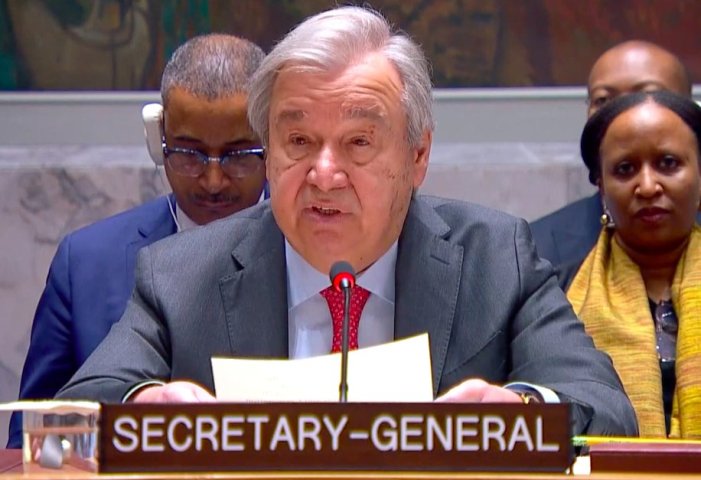UN chief calls blocked aid for Gaza a moral outrage
A long line of blocked relief trucks on Egypt's side of the border with the Gaza Strip where people face starvation is a moral outrage, U.N. Secretary-General Antonio Guterres said during a visit to the Rafah crossing on Saturday.

A long line of blocked relief trucks on Egypt's side of the border with the Gaza Strip where people face starvation is a moral outrage, U.N. Secretary-General Antonio Guterres said during a visit to the Rafah crossing on Saturday. It was time for Israel to give an "ironclad commitment" for unfettered access to humanitarian goods throughout Gaza, said Guterres, who also called for an immediate humanitarian ceasefire and the release of Israeli hostages held in Gaza.
The U.N. would continue to work with Egypt to "streamline" the flow of aid into Gaza, he said in comments made in front of the gate of the Rafah crossing, an entry point for aid. "Here from this crossing, we see the heartbreak and heartlessness of it all. A long line of blocked relief trucks on one side of the gates, the long shadow of starvation on the other," he said. "That is more than tragic. It is a moral outrage."
The visit by Guterres comes as Israel faces global pressure to allow more humanitarian aid into Gaza, which has been devastated by more than five months of war between Israel and Hamas. Israel, which has vowed to destroy Hamas and is worried that the Palestinian militant group will divert aid, has kept all but one of its land crossings into the enclave closed. It opened its Kerem Shalom crossing close to Rafah in late December and denies accusations by Egypt and U.N. aid agencies that it has delayed deliveries of humanitarian relief, saying the U.N. has failed to distribute aid within Gaza.
Israeli Foreign Minister Israel Katz criticised Guterres in a social media post for blaming Israel "without condemning in any way the Hamas-ISIS terrorists who plunder humanitarian aid". NO SAFETY
In remarks made later to reporters, Guterres also reinforced international appeals against an Israeli ground operation in Rafah city on the Gazan side of the border, where a majority of Gaza's 2.3 million residents are sheltering. He questioned Israeli plans to relocate civilians ahead of an incursion. "It is extremely doubtful any successful programme to provide security and safety for the population of Rafah when that security and safety doesn't exist in the whole of the Gaza territory," he said.
In Gaza, fighting raged on Saturday around the enclaves main hospital, where Israel says it has killed more than 170 gunmen in an extensive raid that the Palestinian Health Ministry said also resulted in the deaths of five patients. As hopes for a truce in Gaza during the Muslim holy month of Ramadan have faded and the humanitarian situation has become more desperate, the United States and other countries have sought to use air drops and ships to deliver aid.
But humanitarians say only about one-fifth of the required amount of supplies has been entering Gaza, and that the only way to meet needs is to rapidly accelerate deliveries by road. Before his stop at the border, where he met U.N. humanitarian workers, Guterres landed in Al Arish in Egypt's northern Sinai, where much of the international relief for Gaza is delivered and stockpiled.
Receiving him, regional governor Mohamed Shousha said some 7,000 trucks were waiting in North Sinai to deliver aid to Gaza, but that inspection procedures demanded by Israel had held up the flow of relief. SPREADING HUNGER
This week, a global food monitor warned that famine was imminent in northern Gaza and could spread to other parts of the territory if a ceasefire was not agreed. "It's time for an ironclad commitment by Israel for total, unfettered access for humanitarian goods throughout Gaza," said Guterres.
More than 32,000 people have been killed by Israel's military campaign in Gaza, many of them women and children, according to local health authorities. Israel launched the assault in response to an attack by Hamas in which some 1,200 people were killed and more than 250 taken hostage, according to Israeli tallies.
Guterres, who made one previous trip to Egypt's border with Gaza shortly after the war broke out, is visiting Egypt and Jordan as part of an annual "solidarity trip" to Muslim countries during Ramadan. While in the Egyptian capital Cairo, he is due to break the daily fast with refugees from Sudan, where war between rival military factions has displaced nearly 8.5 million people, driven parts of the population to extreme hunger, and led to waves of ethnically-driven killings in Darfur. (Additional reporting by Yusri Mohamed, Aidan Lewis, Adam Makary and Dan Williams; Writing by Aidan Lewis; Editing by Edwina, Mark Potter and Alex Richardson)
(This story has not been edited by Devdiscourse staff and is auto-generated from a syndicated feed.)










